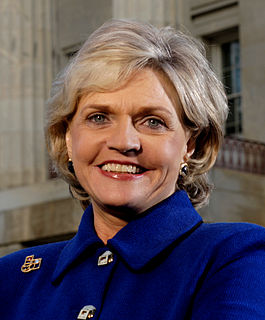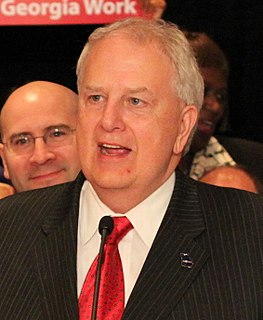
Roy Eugene Barnes is an American attorney and politician who served as the 80th Governor of the U.S. State of Georgia from 1999 to 2003. As of 2019, he is the last Democrat to serve as Governor of Georgia.

The Illinois gubernatorial election of 2006 occurred on November 7, 2006. The Governor of Illinois, Democrat Rod Blagojevich, won re-election for a four-year term scheduled to have ended on January 10, 2011. However, Blagojevich was impeached and convicted in 2009. Many observers expected the race to be close, especially considering the polling, which has shown Governor Blagojevich had a high disapproval rating. However, the Republicans had fared poorly in elections since 2002 due to scandals involving prior Governor George Ryan, and the increasingly unpopular presidency of George W. Bush.

United States gubernatorial elections were held on November 7, 2006 in 36 states and two territories.

The 2006 Texas gubernatorial election was held on November 7, 2006 to elect the Governor of Texas. The election was a rare five-way race, with incumbent Republican Governor Rick Perry running for re-election against Democrat Chris Bell and Independents Carole Keeton Strayhorn and Kinky Friedman, as well as Libertarian nominee James Werner. Perry was re-elected to a second full term in office, winning 39% of the vote to Bell's 30%, Strayhorn's 18% and Friedman's 12%.

The Ohio gubernatorial election of 2006 was held on November 7, 2006, and was a race for the Governor and Lieutenant Governor of Ohio. Incumbent Governor Bob Taft could not run for re-election, because Ohio governors are limited to two consecutive terms in office.

United States gubernatorial elections were held Tuesday, November 4, 2008 in 11 states and two territories. Prior to the election, eight of the total seats were held by Democrats and five by Republicans. Two governors were prohibited by term limits from seeking re-election in 2008.

The North Carolina gubernatorial election of 2008 was held on November 4, 2008, coinciding with the presidential, U.S. Senate, U.S. House elections, Council of State, and statewide judicial elections. Democrat Bev Perdue won the election.

The 2005 regular session of the 148th Georgia General Assembly met from January 10, 2005, to March 31, 2005, at which time both houses adjourned sine die. In addition, Governor Sonny Perdue called for a special session, which met from September 6, 2005, to September 10, 2005. This was the first session since Reconstruction that both houses were controlled by Republicans, as the House of Representatives was won by the GOP at the 2004 election.
The Georgia statewide elections were held on November 7, 2006. The primary election was held on July 18. Contests in which no single candidate received a majority of the vote were decided in a runoff election on August 8.

David J. Shafer is an American politician who formerly served in the Georgia State Senate. He represented Senate District 48, a suburban district located north of Atlanta and including portions of Fulton County and Gwinnett County. Shafer is a Republican.

The 2010 Georgia gubernatorial election was held on November 2, 2010. Incumbent Republican Governor Sonny Perdue was term-limited and unable to seek re-election. Primary elections for the Republican and Democratic parties took place on July 20, with a Republican runoff on August 10. The Libertarian Party also had ballot access and nominated John Monds. On November 2, 2010, Barnes conceded to Nathan Deal. He took office on January 10, 2011.
Georgia's state elections will be held on November 4, 2008. The primary elections were held on February 5, also known as Super Tuesday.

The 2003 Mississippi gubernatorial election took place on November 4, 2003 to elect the governor of the U.S. state of Mississippi. Former Republican National Committee chairman Haley Barbour defeated incumbent Democrat Ronnie Musgrove by a margin of roughly 7 percentage points.

The 2002 Georgia gubernatorial election was held on November 5, 2002. Incumbent Democratic Governor Roy Barnes sought re-election to a second term as governor. State Senator Sonny Perdue emerged as the Republican nominee from a crowded and hotly contested primary, and he faced off against Barnes, who had faced no opponents in his primary election, in the general election. Though Barnes had been nicknamed "King Roy" due to his unique ability to get his legislative priorities passed, he faced a backlash among Georgia voters due to his proposal to change the state flag. Ultimately, Perdue was able to defeat incumbent Governor Barnes and became the first Republican to serve as governor of the state since Reconstruction.

The 1998 Georgia gubernatorial election was held on November 3, 1998. Incumbent Democratic Governor Zell Miller was unable to seek re-election due to term limits, therefore creating an open seat. To replace him, State Representative Roy Barnes won the Democratic Party's nomination after a close and highly contested primary election, while businessman Guy Millner, who had run for Governor and the United States Senate in the previous four years, won the nomination of the Republican Party. In the general election, Barnes was able to defeat Millner by a margin of victory larger than Governor Miller's victory over Millner four years prior, which was in part due to the unpopularity and controversy of Mitch Skandalakis, the Republican nominee for Lieutenant Governor of Georgia. As of 2018, this is the most recent election in which a Democrat was elected Governor of Georgia.

The 2014 Texas gubernatorial election was held on November 4, 2014 to elect the Governor of Texas. Incumbent Republican Governor Rick Perry, who had served since the resignation of then-Governor George W. Bush on December 21, 2000, declined to run for an unprecedented fourth full term, making this the first open election for governor since 1990.























